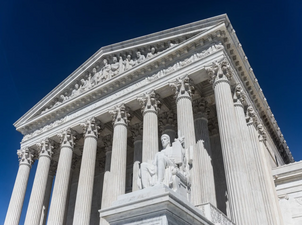
Recent Supreme Court Decisions Highlight Urgent Need for Voting Rights Legislation
Allison Baroni
July 14, 2021
On July 1, the Supreme Court released rulings on two highly significant cases: Brnovich v. DNC and Americans for Prosperity Foundation v. Bonta. Both decisions (each decided 6-3) were disastrous to efforts to strengthen and protect the integrity of United States elections. This tells us what we already knew: the courts will not save us. Now more than ever, we must demand Congress pass the For the People Act (H.R.1/S.1) and the John Lewis Voting Rights Advancement Act. Only through such legislative action can we ensure the protection of our democracy — or, rather, build anew the democratic society that the United States has only imagined itself to be.
The right to vote is often presented as sacrosanct, as if voting has been free and fair since the inception of this nation. But we know that at the time of the first presidential election in 1789, only 6% of those living in the United States (i.e., property-owning white men) were able to vote. And, although gains have been made thanks to organizing and advocacy from marginalized communities pushing to expand that 6%, the right to vote is still denied to many today.
Still, through the efforts of activists we have made historic gains for free and fair elections across the centuries. These gains are not linear and have always been accompanied by losses and by the pushback of those seeking to protect an oppressive status quo. In terms of advancing the freedom to vote in the United States, the July 1st Brnovich v. DNC ruling was a travesty for voters who have historically been disenfranchised by our systems and structures.
The court’s decision in Brnovich v. DNC reverses a Ninth Court decision that had struck down two Arizonan laws, one of which bans third parties from collecting others’ ballots to turn in, and another requiring precincts to throw out ballots accidentally cast at the wrong location. These laws both disproportionately hurt voters of color, and it was on this basis the Ninth Court struck them down, arguing that they violated Section 2 of the 1965 Voting Rights Act. In reversing this decision, the Supreme Court fundamentally gutted this section of the Voting Rights Act, establishing a precedent for which further laws can be passed without concern for their disproportionate impact on Black, Brown, and Indigenous communities’ access to the ballot box.
In Americans for Prosperity Foundation v. Bonta, the Court ruled in favor of major donors to charities and nonprofit groups, striking down a California law that had attempted to mitigate the impact of invisible money on our politics. Instead of supporting efforts to address the growing control of money on our elections and institutions, this decision prioritizes the interests of wealthy donors and dark money under the guise of protecting First Amendment rights. This justification for the decision begins to collapse upon only a little investigation: the California law had only required disclosure to the Attorney General, not the public, already protecting these donors from pushback from public opinion.
Fortunately, the impact of both rulings can be remedied by passing legislation currently before Congress. The For the People Act would ensure a basic standard of access to the ballot for everyone — no matter one’s zip code. It would also apply disclosure laws for big donors and dark money and strengthen our federal enforcement of campaign rules. Additionally, the John Lewis Voting Rights Advancement Act would protect the disenfranchised by preventing states from passing racially discriminatory laws moving forward. We have come too far to move backwards. Passing both of these bills is the only acceptable Congressional response to these decisions from the Supreme Court. Doing so, continuing to build an equitable democracy, is how we bring into existence the world we wish to live in.
Allison Baroni is a rising senior at Villanova University where she studies Peace and Justice & Theology. Allison is a member of the NETWORK Government Relations team this summer.







